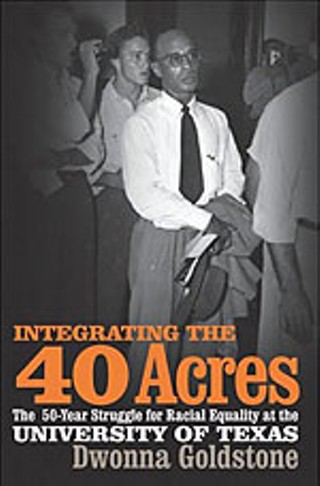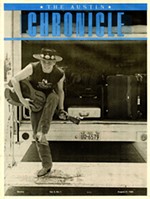Integrating the 40 Acres: The 50-Year Struggle for Racial Equality at the University of Texas; The Texas Book: Profiles, History, and Reminiscences of the University
Cen-Texts
Reviewed by Lee Nichols, Fri., Dec. 15, 2006
Integrating the 40 Acres: The 50-Year Struggle for Racial Equality at the University of Texas
by Dwonna Goldstone
University of Georgia Press, 213 pp., $29.95
The Texas Book: Profiles, History, and Reminiscences of the University
edited by Richard A. Holland
University of Texas Press, 256 pp., $29.95
Milestones invariably produce memorials to such, and the University of Texas reached a pair this year: 2006 marked both the 125th anniversary of the legislation creating UT and the 50th year since the Board of Regents voted to admit black undergraduates. Not surprisingly, there are books to accompany both.

UT's strategy, she writes, was to follow the court's order to admit black students to the classroom … but still remain openly hostile to African-American participation in the other facets of campus life so vital to college experience. The dorms fiercely maintained segregation; Greek organizations kept racially pure memberships; and sports teams took ridiculously long to integrate, capped by the 1969 football team – infamously, the last all-white squad to win the national championship. Central to the social separation, Goldstone claims, was an obsession with keeping black men away from the state's pure white daughters. The effect has lingered: In a state that is 15% black and 30% Mexican-American, those races account for a mere 4% and 7% of its flagship university. Goldstone quotes a black undergrad who said blacks on campus were "desegregated, but not integrated."

English professor and Texas literature specialist Don Graham offers a clear-eyed and unromanticized reappraisal of the man who almost single-handedly created Graham's field, J. Frank Dobie; José Limón affectionately recounts the career of Tejano folklorist Américo Paredes, who approached UT with fear but came to regard it as home; editor Dick Holland's story of the feud between university regents and funders G.W. Littlefield and G.W. Brackenridge is as riveting as any history of the Civil War in which their mutual hatred was rooted; and a chapter on UT's first dorm and a personal memoir from World War I-era grad and former state Supreme Court Justice Meade Griffin paint vivid pictures of a school that bears little resemblance to the monster UT has become – even the iconic Tower wasn't built yet. And several chapters, including one on Sweatt, squarely tackle the same shameful period that Goldstone covers in her book.
In short, The Texas Book is far more than a pretty decoration for the living rooms of rabid orangebloods. It is absorbing reading for anyone who has a fascination, either loyal, antagonistic, or mixed, with the sprawling empire situated in the heart of our city and state.










